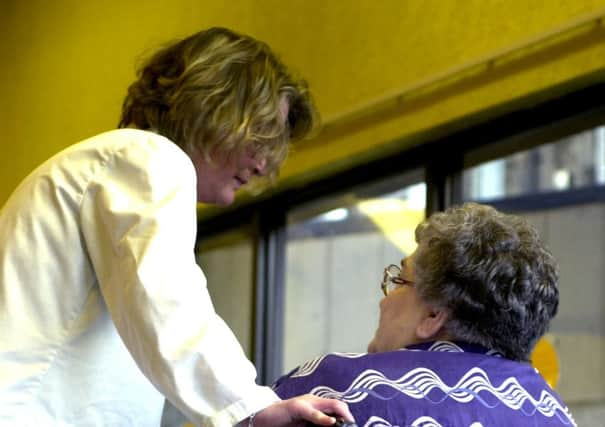Better palliative care is top priority


Why do some people with a terminal illness other than cancer miss out on palliative care? If you have one or a combination of the most prevalent terminal illnesses, such as heart failure, chronic obstructive pulmonary disease (COPD) or dementia, shockingly, you may not get the care and support you need. In Scotland, around 40,000 of the 54,700 people who die each year need palliative care.
Palliative care is often recommended for people living with a terminal illness. It can include pain and symptom management, as well as physical, emotional and spiritual support. Although this issue is complex, we think there are two reasons why people who have a condition other than cancer miss out. Firstly, there is a lack of understanding amongst some healthcare professionals and the public about what palliative care can do, who it can benefit and when it should be introduced. This can be because some disease courses are hard to predict, so it is difficult to know when the person has become terminally ill, and some diseases aren’t always considered to be terminal.
Advertisement
Hide AdAdvertisement
Hide AdSecondly, professionals do not receive enough training to be able to recognise when someone needs palliative care or when someone is dying. There is an overwhelming need to make palliative care everyone’s business.
Palliative care can be, and is, delivered by a wide range of professionals across a range of settings. This includes geriatricians, cardiologists, and GPs, not just palliative care professionals.
In the report Triggers for Palliative Care and its accompanying implications for Scotland report, released on 23 June, Marie Curie has highlighted a number of barriers people living with a terminal illness face in receiving palliative care and how we might address some of these challenges.
To help healthcare professionals, patients and their carers to recognise the signs, we have highlighted a series of “triggers”, which can indicate that a palliative care approach might be needed. These triggers can include the patient having complex or persistent problems with a symptom, such as continuous pain or breathlessness, high levels of hospital use and especially unplanned admissions, more than one condition to manage, weight loss or a change in eating habits, or new clinical interventions such as ventilator support, and for some conditions, such as Motor Neurone Disease, palliative care may be needed at the point of diagnosis.
There are also a range of screening tools that healthcare professionals could use to help identify patients needing palliative care. Ensuring that all healthcare professionals working with a terminal illness have training so that they can identify these triggers, and can feel confident to talk to their patients about end of life as well as help deliver palliative care, can help ensure that more people get the support and care they need without placing a huge and perhaps unnecessary demand on specialist palliative care professionals.
The number of people dying in Scotland is due to increase by 13% over the next 25 years so we need to act now or this problem will get much worse. Marie Curie fully supports the Scottish Government’s commitment to publishing a new strategic framework for action for palliative and end-of-life care in 2015. This is an opportunity to set out an ambitious plan to ensure that everyone living with a terminal illness gets the care they need. We believe that the framework should include a clear commitment to ensure that everyone with a palliative care need has access to it by 2020, regardless of condition.
We also make a number of other recommendations in our report, which include required palliative care training and support for everyone working with people with a terminal illness and supporting better understanding between palliative care specialists and disease-specific specialists to improve care pathways.
Shona Robison MSP, Cabinet Secretary for Health, Wellbeing and Sport, stated that palliative care would be an “early priority” for the new integrated health boards. We hope they look to tackle the palliative care needs in their areas as they now develop their board strategies for the coming three years. The next six months presents us with the best opportunity to shape palliative care in Scotland for the rest of the decade. We must all work to get this right for our family, friends and ourselves when the time comes.
• Richard Meade is Marie Curie Head of Policy & Public Affairs, Scotland. Visit mariecurie.org.uk/change
SEE ALSO